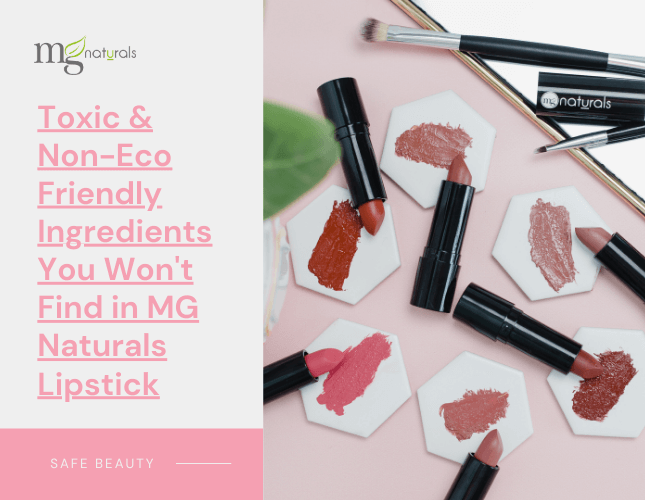Your Cart is Empty
FREE SHIPPINGAustralia $70+ International $180+


Everyday you put on lipstick and inevitably eat a little bit. So it’s important to know: is your lipstick safe?
Keep an eye out on these toxic ingredients that are probably lurking in your lipstick:
Dimethicone (also known as polydimethylsiloxane or PDMS) is technically a silicone-based polymer. More simply, it acts as a lubricant, helping lipsticks glide across your lips more easily. Weirdly enough, this chemical can also be found in caulking, silly putty, and even McDonald’s chicken nuggets.
So what’s the deal with dimethicone in your lipstick? It forms a moisture barrier that makes your lips feel soft and supple. But dimethicone isn’t discriminatory and will also trap bacteria, sweat, and the like under that barrier, too. Over time, your lips can become dry & irritated.
Our Organic Glow Lipstick glides on smoothly because it contains nutrient rich organic cocoa butter ensuring your lips ultra hydration, moisturisation, and protection from pollution and smog.
It is derived from the cocoa bean and includes vitamins A and E, and is also a great source of natural antioxidants. It adds a protective hydrating layer to lips, helping protect them from extreme temperatures and indoor heat that can leave your lips dried out.
Have you ever heard of this exotic-sounding mineral wax? Sometimes labelled as paraffin wax, it basically ensures that your lipstick keeps its form, never crumbling or breaking in half. Its function is innocent enough, so what’s the catch?
Ozokerite is a fossil wax, harvested from coal and shale. It is mined, primarily in Eastern Europe, and can be black in its purest form. Dark wax doesn’t exactly suit most lipstick shades, so it's heavily refined to become white or yellow for cosmetics. Though hygienically safe to use, ozokerite is still a heavily processed material that highly impacts the Earth when it's extracted.
Here at MG Naturals we use candelilla wax, which is a fantastic cruelty-free and eco-friendly alternative to both bee and mineral waxes. This natural, vegan ingredient is harvested from candelilla shrubs, grown natively in Mexico and the Southwestern United States. It also creates a strong stick that won’t buckle under the pressure of everyday use.
Did you know that about 4,000 chemicals are currently used to scent products, but you won’t find any of them listed on a label. Fragrance formulations are considered a “trade secret” and therefore protected from disclosure – even to regulators or manufacturers. Instead, one word, fragrance, appears on ingredients lists for countless cosmetics, personal care and cleaning products. A single scent may contain anywhere from 50 to 300 distinct chemicals.
This vague ingredient can also go by terms like flavour, aroma, or parfum. Be wary of the word vanillin, as well, which is a cheaper additive that mimics vanilla. These scents are often synthetically manufactured in labs and unverifiable to the public. And if there isn’t a way for you to confirm whether or not something is hypoallergenic, cruelty-free, or vegan — it’s time to move on. Transparency is key!
We only use certified organic sweet orange essential oil to scent and uplift our handmade lipsticks, giving a surprisingly subtle boost of citrus to every tube. It’s great for calming both the mind and chapped lips.
Also known as wool fat, this greasy secretion helps sheep protect themselves against inclement weather. Lanolin is harvested by washing sheared wool in hot water and treating it with detergent. This process is repeated until the wax is stripped of bacteria or impurities, like sweat salts or grease. In this new era of plant-based beauty, one has to wonder why we’re still relying on such an arcane and intensive process. Ditching this animal by-product as a moisturiser means that we can instead use ingredients that don’t need so much refining or processing to be safe for human use.
We only use organic castor oil and jojoba oil to give our lipstick its beautiful feel and rich satin finish. Jojoba oil is rich in vitamin E, vitamin B-complex and zinc. It moisturises your lips and is responsible for that flawless lipstick application. While the fatty oils, vitamins, and minerals in castor oil help heal chapped lips.
Most "so-called" natural makeup brands contain non-eco friendly ingredients and a host of toxic, irritating chemicals that damage your health & your skin. But makeup should never be a health hazard!
What makes our makeup so pure and good for your skin is not so much the organic ingredients that we include, it’s all the ingredients we don’t & never will use. Time to ditch those non-eco friendly and toxic lippies! ;) If you’re still looking for an affordable lippie with skin-loving ingredients you can actually pronounce, choose MG Naturals’ organic lipsticks.